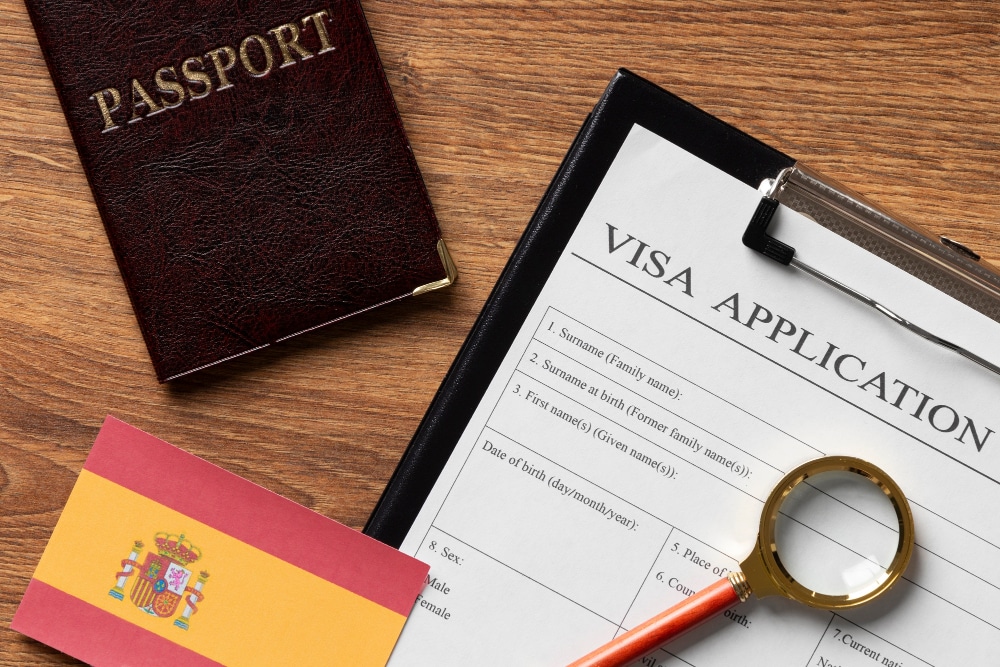At Benalmadena International College (BIC), we understand that transitioning to a new country, especially one as vibrant and welcoming as Spain, involves a series of administrative steps that may initially seem complex. Our commitment extends beyond providing an excellent education for your children; we are also dedicated to give support through every stage of your integration into Spanish life. For this reason, we have prepared this detailed guide on obtaining the Número de Identificación de Extranjero (NIE), a fundamental document for the establishment and of your children in this wonderful country.
The NIE, or Número de Identificación de Extranjero, is far more than a mere sequence of characters; it is the key that unlocks full participation in Spain’s legal, economic, and social life. At BIC, we know that the peace of mind of families is paramount to the academic and personal success of our students. Therefore, we want to assure you that, although the process requires attention and diligence, it is perfectly manageable with the right information and support.
Understanding the Essence of the NIE: A Cornerstone for Your Life in Spain
The NIE is a central element within the Spanish bureaucratic framework for foreign citizens. Understanding its significance and requirements will not only simplify various administrative processes but also enable you and your children to fully enjoy the opportunities that Spain offers.
What is the NIE?
The Número de Identificación de Extranjero (NIE) serves as a unique identification number assigned to non-Spanish residents. It is allocated to individuals needing to engage in legal or economic activities within the country. It is crucial to note that this number, by itself, does not grant residency. However, it is indispensable for undertaking a multitude of essential transactions. At BIC, we observe daily how the NIE facilitates the lives of our international families, allowing them, for example, to enroll their children in extracurricular activities or manage basic services.
The Importance of the NIE
The relevance of the NIE cannot be overstated. It is a mandatory requirement for a wide range of activities, including:
- Employment: If either parent plans to work in Spain, the NIE is an indispensable requirement for employment contracts.
- Property Transactions: Whether you wish to purchase a property to establish your family home or rent accommodation near our campus in Benalmádena, the NIE is necessary to formalize these agreements.
- Bank Accounts: Opening a bank account, a fundamental step for managing your finances in Spain, typically requires the presentation of the NIE.
- Legal Documentation: For any legal procedures involving foreign citizens, the NIE is a key document.
- Essential Services: From contracting internet services to enrolling in gyms or sports clubs, the NIE is frequently requested.

It is important to remember that, while the NIE facilitates many activities, it is not an indicator of tax residency status. Individuals can possess an NIE and yet remain fiscally resident in another country. Therefore, understanding its implications and uses is vital for compliance with local laws and for proper financial planning for your family.
Who Needs an NIE?
The NIE is required for any foreigner intending to live, work, or invest in Spain. This includes the diverse nationalities that enrich the Benalmadena International College community:
- Citizens of the European Union: EU nationals need an NIE for formal activities, such as employment or real estate purchases.
- Non-EU Citizens: Those from outside the EU often must obtain an NIE as part of their residency application.
- Students: Even if your children are enrolled at BIC, if they are international students and wish to work part-time in the future or handle certain administrative tasks, they might need an NIE.
- Investors and Entrepreneurs: Families planning to establish a business presence in Spain must obtain an NIE.
In summary, the NIE is a crucial document for anyone engaging with Spanish society or economy. Its applicability extends across various demographics, emphasizing its relevance in day-to-day activities as a foreigner in Spain. At BIC, we are here to guide you through this process, ensuring that your primary focus can remain on the education and well-being of your children.
Preparing for Your NIE Application: The Key to Success
Gathering the necessary documentation and understanding the application process is fundamental for a successful NIE application. This section outlines the required documents and common mistakes to avoid, facilitating a smoother application experience for BIC families.
Required Documentation: An Essential Checklist
Several documents are essential to submit when applying for the NIE. Careful preparation of these documents reduces the risk of delays or rejection.
- Application Form EX-15: The first step in the application process is completing the EX-15 form. This form must be filled out in Spanish and can often be completed online for convenience. It’s crucial to review all entries carefully and sign it only just before submission. At BIC, we can guide you on where to find this form and, if needed, offer resources for its correct completion.
- Proof of Need for NIE: Applicants must provide evidence that justifies the need for an NIE. Acceptable documents include employment contracts, proof of property purchase (e.g., a deposit contract or a deed), or enrollment letters from educational institutions. For BIC families, an admission or enrollment letter from our college can serve as proof of your intention to establish yourselves in Spain for educational purposes. These documents should clearly indicate the reason for the NIE application.
- Valid Passport and Copies: A valid passport is another critical requirement. The original passport must be presented along with a photocopy of the personal information page. It is vital to ensure that the passport has not expired, as this could lead to application delays. We strongly advise all families to check the validity of their passports well in advance.
- Representative Documentation (if applicable): If a representative (e.g., a lawyer or a gestor) will be submitting the application on behalf of the applicant, specific documentation must be provided. This includes a copy of the representative’s identification and a notarized power of attorney letter that authorizes them to act on the applicant’s behalf. At BIC, we understand that some families prefer to delegate this process, and we can recommend trusted professionals who can assist you.
- Consular Proof of Residence (or Spanish Address Proof): Applicants must also demonstrate their residence within the consulate’s jurisdiction (if applying from outside Spain) or their address in Spain. Acceptable proof may include utility bills (water, electricity, gas), rental contracts, or any official correspondence that includes the applicant’s address. This documentation helps to establish residency claims.
- Payment of Application Fee: A fee must be paid when submitting the NIE application. The fee varies by location and is subject to change. It is advisable to check the latest fee details prior to application to ensure correct payment. Generally, this payment is made at a bank with a specific form (Modelo 790, code 012) which can be obtained at the police station or downloaded online.

Common Mistakes to Avoid: Learning from Experience
Several pitfalls can complicate the NIE application process. Being aware of these issues can help applicants navigate their submissions more efficiently.
- Incomplete Documentation: This is, perhaps, the most frequent error. The absence of a single document can lead to significant delays or even rejection of the application. At BIC, we always emphasize the importance of meticulousness.
- Incorrectly Filling Out Forms: Particularly the EX-15. An error in a single piece of data, a signature in the wrong place, or an uncompleted section can impede the process. Take your time to review every field.
- Failing to Bring Copies of Necessary Documents: Even if you present the originals, it is essential to bring photocopies of all required documents. Offices usually do not have photocopying services.
- Overlooking the Need for Proof of Residence or Correct Fee Payment: Ensure you have valid proof of address and the bank payment receipt for the fee.
By taking the time to prepare and verify all documentation, BIC families can streamline their process and significantly improve the chances of a successful application. Our administrative team is always available to offer general advice and point you towards reliable resources for specific queries.
Booking Your NIE Appointment: Strategic Planning
Securing an appointment for your NIE is a crucial step in the application process. This phase requires careful planning and awareness of the available options.
Scheduling Through the Official Website
The first step in booking an NIE appointment is visiting the official Spanish government website dedicated to immigration processes. Here, users can find the specific section for scheduling appointments.
- Start by selecting the appropriate province where the application will be submitted. For families residing in or moving to Benalmádena, this will typically be Málaga.
- Follow the prompts to choose the type of appointment required for the NIE. This is usually “Policía – Expedición de Tarjeta de Identidad de Extranjero (TIE) y Certificados de la UE” or similar, depending on whether you are an EU or non-EU citizen.
- Be prepared to fill in personal details such as identification number (if you have one already, otherwise your passport number) and contact information.
- It is advisable to check for any required documentation that must be presented on the day of the appointment, although this guide covers the main ones.
Consular Office vs. In-Country Application: Choosing the Right Path
Choosing the right location for your appointment is essential, especially for expatriates. There are two primary options available: making an appointment at a consular office or in-country at a local immigration office.
- Consular Office: Ideal for individuals applying from outside Spain. Here, they can initiate the NIE process while still in their home country. This is often the first step for families planning their move to Spain and enrolling their children at BIC. Applying at a Spanish Consulate in your home country can help you arrive in Spain with some of the initial bureaucracy already handled.
- In-Country Application: Recommended for those already residing in Spain. This allows them to handle their application directly with local authorities (National Police stations or Foreigners’ Offices). Many BIC families choose this route once they have settled into their new homes in Benalmádena or the surrounding areas.
Managing Wait Times: Patience and Persistence
One of the most significant challenges in obtaining an NIE appointment is managing potential wait times. This can vary widely based on location and current demand.
- Check the availability of appointments regularly to secure the earliest possible date. Appointment slots can open up unexpectedly, so frequent checking is key.
- Some regions may experience higher demand, leading to longer delays. It’s beneficial to start this process as soon as possible, ideally as soon as you confirm your move to Spain and your children’s enrollment at BIC.
- Consider setting reminders for appointment slots, as they may open up suddenly, especially early in the morning.
- Be flexible with locations: If possible, check appointment availability in nearby towns or cities within the same province, as some offices might have shorter waiting lists.
All applicants should remain patient throughout this process. The intricate nature of bureaucracy in Spain often leads to longer-than-expected waiting periods. Proper preparation and timely scheduling can greatly reduce stress associated with this stage of obtaining the NIE. At BIC, we understand these challenges and encourage families to reach out if they need general guidance on navigating these waiting periods.
Submitting Your Application: The Appointment Day
Once all required documents are collected and sorted, the next step is to submit the application for the NIE. This phase includes several key actions to ensure the process goes smoothly.
Tips for the Day of the Appointment: Making a Good Impression
Arriving well-prepared on the day of the appointment is crucial for a successful application submission. Here are some practical recommendations:
- Arrive early to the appointment location to allow time for any unexpected delays, finding parking, or locating the correct office within the building. Punctuality is appreciated.
- Bring all the required documents, including printed forms and copies, neatly organized in a folder. This facilitates the submission process for both you and the official.
- Dress appropriately, as a professional appearance can help in creating a positive impression. While not strictly required, it conveys respect for the process and the officials.
- Be polite and respectful to the officials at the office; a courteous attitude can positively influence your experience. Remember, they are there to process your application.
- Take a pen with you, as it may be needed for signing any documents on-site or making last-minute corrections.
- Be prepared for a wait, even with an appointment. Government offices can sometimes run behind schedule. Bring something to read or do while you wait.

Document Verification Process: What to Expect
At the appointment, the submitted documents will undergo a thorough verification process. It’s essential to understand how this works:
- Officials will review your application form (EX-15) to ensure it is completed accurately. Any mistakes or omissions may result in a delay or rejection of the application, requiring you to return for a new appointment.
- Your proof of need for the NIE will be checked, confirming that the reason provided (e.g., enrollment at BIC, property purchase, job offer) aligns with the documents submitted.
- Identity verification will include comparing your original passport with the copies that have been provided. Ensure your passport is valid and matches the details on your application.
- The payment receipt for the fee (Modelo 790) will be verified. Make sure you have the stamped bank receipt.
- After the verification, the official will either accept your application and provide you with a temporary NIE certificate (often a white paper document) or inform you if any additional documents are required. In some cases, the NIE number might be provided immediately, while the physical certificate might be issued later.
How to Handle Rejections: A Path Forward
If the application is unfortunately rejected, there are steps to follow to rectify the situation:
- Request an explanation for the rejection. Understanding the specific reasons will help in addressing issues for resubmission. Do not leave the office without a clear understanding of why your application was not accepted.
- Gather any additional documents needed as outlined by the officials. They should provide you with a list of missing or incorrect items.
- Consider seeking assistance from professionals or agencies with experience in assisting with NIE applications to improve the chances of success on resubmission. Many gestorías (administrative agencies) specialize in this. At BIC, we can often provide recommendations for reputable local professionals.
- Submit a new application promptly, ensuring all feedback from the previous submission is addressed adequately. Do not delay, as the reasons for your NIE need remain.
Remember, a rejection is not the end of the road. It is an opportunity to correct any oversights and resubmit a stronger application.
After Receiving Your NIE: Unlocking Opportunities
Receiving the NIE opens up various opportunities in Spain. Understanding how to utilize this number effectively in daily life is essential for BIC families.
Understanding Your NIE Number: Its Format and Implications
The NIE number is a unique identifier assigned to foreign nationals in Spain. This number is crucial for engaging in financial and legal activities, such as opening a bank account or securing employment. The format of the NIE consists of a letter followed by seven digits and another letter, for example, $X1234567Y$.
It is important to verify that the number on your documentation is accurate. Any discrepancies could lead to complications when attempting to use it. The NIE does not imply residency or tax obligations in Spain, so the holder should be aware of their own tax situation in relation to their home country. For complex tax matters, consulting with a tax advisor specializing in international taxation is highly recommended for BIC families.
Using Your NIE in Daily Life: Practical Applications
Once the NIE has been obtained, it can be used in numerous scenarios, significantly simplifying your daily life in Spain:
- Opening a Bank Account: Most banks in Spain require an NIE for identification and to establish an account. This is one of the first steps many BIC families take upon arrival to manage their finances locally.
- Receiving a Job Offer: Employers will ask for the NIE as part of the employment process. It is essential for formalizing contracts and social security registration.
- Purchasing Property or Renting a Home: The NIE is necessary to complete transactions and contracts in the real estate market. This includes signing rental agreements, purchasing a home, or even setting up utility contracts for your residence.
- Accessing Healthcare: EU citizens can use their NIE to register for healthcare services (e.g., through the public health system), while non-EU residents may need additional documentation, such as private health insurance, which is often a requirement for their visa.
- Signing Contracts and Dealing with Public Authorities: Many administrative processes, from setting up internet and phone services to registering for local council services (like the padrón), require a valid NIE.
- Registering for Services and Activities: For example, enrolling in local sports clubs, language classes, or even obtaining a library card will often require your NIE. For BIC students, while their school enrollment is handled by the college, their parents’ NIE will be crucial for many family-related activities outside of school.
- Obtaining a Spanish Driving License: If you plan to drive in Spain, your NIE will be required as part of the process to exchange your foreign license or obtain a new Spanish one.

Keeping Your NIE Secure: Protecting Your Identity
It is imperative to maintain the security of your NIE to prevent identity theft or fraudulent activities. Here are some considerations for safeguarding this important document:
- Store the original document in a safe place, such as a locked drawer or a safe. Avoid carrying the original with you unless specifically required.
- Keep a list of who has access to your NIE and avoid sharing it unnecessarily. Only provide it to official entities or trusted professionals when required for legitimate purposes.
- Monitor any transactions related to your NIE, especially when engaging in financial activities. Regularly check bank statements and other financial records.
- If the NIE is lost or stolen, report it to the authorities immediately (local police) to prevent misuse. You will then need to apply for a duplicate.
Implementing these security measures will help ensure that the NIE remains a beneficial asset without compromising your safety and privacy.
Special Considerations for Non-European Union Citizens: Navigating Additional Requirements
Non-European Union citizens face unique challenges when applying for the NIE. Understanding the specific requirements and legalities can significantly streamline the application process for BIC families from outside the EU.
Additional Visa Requirements: A Prerequisite for Many
For individuals from outside the EU, obtaining the NIE often correlates with visa regulations. A visa may be necessary to ensure compliance with Spanish immigration laws. Depending on the purpose of the stay, various types of visas may need to be secured prior to applying for the NIE. Common visa categories include:
- Work Visa: Required for those who have secured employment in Spain. This visa is typically sponsored by the employer.
- Student Visa: Necessary for individuals enrolled in educational institutions for long-term studies. While your children will have their student visas for BIC, parents accompanying them may need a different type of visa (e.g., non-lucrative visa) if they are not working.
- Non-Lucrative Visa: For individuals who wish to reside in Spain without engaging in work activities, demonstrating sufficient financial means to support themselves and their dependents (including BIC students) without working.
- Self-Employment Visa: For those intending to start a business or work as freelancers in Spain.
Each visa category carries its specific documentation, application procedures, and timelines, which should be meticulously followed to avoid complications in obtaining the NIE. Visa validity and its alignment with the NIE application timelines should be noted carefully. It is crucial to apply for the correct visa type that matches your family’s circumstances and intentions in Spain. The BIC admissions team can provide general guidance on common visa types for our international families.

Ensuring Compliance with Spanish Law: A Foundation for Stability
Adhering to Spanish legal requirements is paramount for non-EU citizens. Failure to meet these obligations can lead to delays or outright denial of the NIE application, and potentially affect your residency status. Key compliance issues to be aware of include:
- Maintaining Valid Residency Status: It is vital to ensure that any visa or residency permits are kept current. Overstaying a visa or letting a residency permit expire can lead to serious legal consequences and difficulties in future applications.
- Reporting Changes: Any changes in personal circumstances or legal status (e.g., change of address, marital status, or employment) must be reported to the relevant authorities promptly.
- Understanding Tax Obligations: Non-EU citizens should familiarize themselves with the Spanish tax system and declare income as required to avoid legal issues. This includes understanding whether you are considered a tax resident in Spain or not, and the implications for your global income.
A clear understanding of local laws and regulations contributes to a smoother process. Consulting with legal experts who specialize in immigration can be beneficial in navigating complexities and ensuring full compliance. The BIC community often shares experiences and recommendations for reliable legal professionals who can assist with these matters.
Frequently Asked Questions: Addressing Common Concerns
This section addresses common inquiries regarding the NIE process, providing clarity on various aspects to assist individuals in navigating their application.
Does the NIE Grant Residency?
No, the NIE itself does not provide residency status in Spain. It is primarily an identification number necessary for foreign nationals engaging in certain activities within the country. While possessing an NIE is pivotal for tasks such as buying property or applying for a job, it does not imply legal residency rights. Individuals seeking to reside in Spain must still comply with residency regulations, which often involve applying for a residence permit or visa, depending on their nationality and circumstances. For BIC families, this means that while the NIE is essential, it is separate from the visa or residency permit that allows you to live in Spain long-term.
How Long is the NIE Valid?
The NIE is a lifetime number and does not expire as it is assigned permanently to an individual. This means once obtained, the number remains the same throughout one’s life. However, the documentation associated with the NIE, especially in terms of its relevance for particular transactions or residency applications, may have different validity periods. For example, the physical NIE certificate (the white paper document) might not be accepted as proof of identity after a certain period, and you might need to obtain a TIE (Tarjeta de Identidad de Extranjero) if you become a resident. It’s vital to keep informed about any changes in legal requirements that might affect the NIE’s usage for administrative tasks.
Can the Application be Made by a Representative?
Yes, it is possible for a representative to apply for the NIE on behalf of an individual. This is particularly relevant for those who may not be able to attend in person due to distance or other constraints. To authorize a representative, specific documentation must be provided:
- A copy of the applicant’s valid passport.
- Proof of the representative’s identity.
- A power of attorney (poder notarial) or formal letter granting permission for the representative to act on your behalf. This power of attorney must be properly legalized and translated if issued outside Spain.
It is crucial that all forms are correctly filled and submitted to ensure a smooth application process, regardless of whether it is the individual or their representative handling the submission. Many BIC families choose to use a gestor or lawyer for this process to ensure accuracy and efficiency.
Contacting Spanish Authorities for Assistance: Where to Find Help
When facing challenges related to the NIE application process, reaching out to the appropriate Spanish authorities can provide the necessary guidance and support.
Directorate General for Foreigners (Dirección General de Extranjería)
The Directorate General for Foreigners is the key governmental body responsible for dealing with foreign residents in Spain. This organization oversees the issuance of NIEs and provides essential information regarding immigration matters. Their primary goal is to facilitate the integration of foreigners into Spanish society.
Queries regarding specific NIE concerns can often be addressed by contacting local offices (e.g., the Foreigners’ Office or National Police stations) or through their official channels. Their representatives are trained to assist with various aspects of foreign residency, including updating any changes in personal circumstances that might affect one’s residency status.
Website Resources and Email Queries: Digital Support
The official website of the Directorate General for Foreigners (often found within the Ministry of Interior’s website) serves as a vital resource for information related to the NIE. Through this website, users can find downloadable forms, details about office hours, and notifications regarding any procedural changes. The website is regularly updated to reflect the most current regulations and requirements.
- General information on the NIE application process.
- Links to necessary forms and documentation, such as the EX-15 and Modelo 790.
- Announcements of any updates regarding processing times or changes in regulations.
For cases requiring additional clarification, email inquiries can sometimes be submitted through official channels listed on the website. This method allows for documentation to be attached, thereby providing officials with the context required to address specific issues. Response times may vary, so patience is recommended.
The Benalmadena International College’s Commitment to Your Family’s Integration
At BIC, we understand that the administrative journey of moving to a new country can be daunting. Our role extends beyond the classroom walls. We are deeply committed to supporting our international families in their transition and integration into the vibrant Spanish community.
- Guidance and Resources: While we cannot directly process NIE applications, our administrative team is well-versed in the general requirements and can guide you to official resources and reputable local professionals (gestores, lawyers) who specialize in immigration matters. We often share updated information and best practices within our parent community.
- Community Network: BIC fosters a strong, supportive international community. Many of our current families have successfully navigated the NIE process and are often willing to share their experiences and tips, providing invaluable peer support. We encourage new families to connect with our existing parent body.
- Focus on Education: By helping you understand and manage these administrative necessities, we aim to free up your time and energy so you can focus on what truly matters: your children’s education and their flourishing at Benalmadena International College. We believe that a smooth integration into Spanish life contributes significantly to a child’s overall well-being and academic success.
- Local Knowledge: Being deeply rooted in Benalmádena, BIC has extensive local knowledge. We can provide insights into local services, amenities, and the general way of life, further assisting your family’s settlement.
We hope this comprehensive guide provides clarity and confidence as you embark on the process of obtaining your NIE. The team at Benalmadena International College is here to support you every step of the way, ensuring that every family’s experience in Spain is as smooth and enriching as possible. We look forward to welcoming your children to our thriving international community.
Bibliographic references
- Tejada Solicitors – “How to get NIE number in Spain: 2025 Guide”
- Jobbatical Blog – “How to Get an NIE Number in Spain: A Step-by-Step Guide”
- MovingToSpain.com – “The NIE Number in Spain: Who Needs One and How to Apply”


